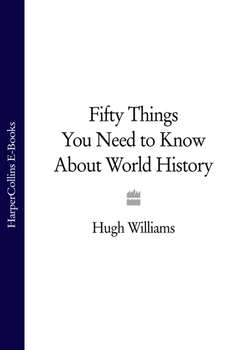Читать книгу Fifty Things You Need to Know About World History - Hugh Williams - Страница 19
Introduction
ОглавлениеFreedom is a much-abused concept. In English we use two words meaning the same thing – ‘freedom’ and ‘liberty’. The first has a Teutonic root, the second comes from the Latin. Most other European languages have only one word, for example, liberté in French, freiheit in German or libertad in Spanish. The sad fact is that however many words are used to describe it, in the history of the world those promising liberty or freedom have often lied. Movements claiming to set people free have ended up imprisoning or suppressing them. True freedom is both hard to find and define. Like happiness, with which it is often associated, it is one of the most desired yet most elusive accompaniments to the progress of mankind.
In his book On Liberty published in 1859, the British political philosopher John Stuart Mill argued that ‘the only purpose for which power can be rightfully exercised over any member of a civilised community, against his will, is to prevent harm to others. Over himself, over his own body and mind, the individual is sovereign.’ As with all philosophical pronouncements, it is a statement that begs some questions – most importantly in this case, what is the definition of preventing harm to others? But the broad principle of Mill’s thought is one that many of us would agree with today. It remains a remarkably modern definition of liberty. For most of us our individual freedom is the most precious thing we possess. Furthermore, we take it for granted.
The journey to this state of affairs has been a long one, and it is not finished yet. It started in ancient Greece with philosophers like Socrates who argued that accepted truths should always be tested by rational argument and free discussion. From there it travelled into Roman thought where politicians like Cicero adopted the Socratic approach to open debate. The triumph of Christianity in Europe led eventually to the medieval age of suspicion and persecution. Argument became heresy in the mire of the Inquisition. By the fifteenth century, the ideas of the Renaissance, combined with the desire for greater religious freedom that inspired the Reformation, began to shake the foundations of the Church, although freedom of thought was still suppressed. Protestants could be just as ruthless as Catholics in exterminating opinions of which they did not approve. It was not until the end of the seventeenth century, when scientific discovery started to undermine the defences of a world built on religious foundations, that rational thought burst into the explosion of ideas we call the Enlightenment. From that time on concepts of freedom that we would recognise today came into being. Modern political thought has its beginnings in the philosophers of the late seventeenth and eighteenth centuries.
This section of the book picks its way through this process beginning with the slave rebellion against the Roman Republic led by Spartacus in 73 BC. Its bravery and brilliance have been an inspiration for many of those fighting for freedom ever since. Jan Hus, a Czech who was burned at the stake for his religious beliefs in Constance, Germany, in 1415 was one of the first great leaders of opposition to the Catholic Church in the Middle Ages, and is still regarded as a national hero in his own country. The American Declaration of Independence of 1776 and the French Revolution that began in 1789 were two of the greatest upheavals in world history. The first led to the creation of a great democracy while the other’s high ideals were drowned in blood and resulted in Napoleonic dictatorship. The concept of individual freedom is arguably nowhere better expressed than in the works of Beethoven, whose music embodies the Romantic movement. The Zulu War of 1879 was an unsuccessful fight for liberty against the oppressive power of the British Empire; in Russia in 1917 the Bolshevik Revolution overthrew the monarchy of the Romanovs, promising liberation but building a terrifying Communist monolith instead; and in 1949 Mao Zedong became the Communist leader of China and began the ruthless control of his nation that would begin its transformation into a great world power. But in Europe the power of Communism fell into decline, its end signalled by the collapse of the Berlin Wall in 1989. A year later, the greatest African leader of the twentieth century, Nelson Mandela, was released from prison. The oppression of apartheid ended as he began the leadership of his country to black majority rule.
Each of these events can be seen as stepping stones to freedom. Together they provide a series of points from which we can look forward and back at man’s attempts to make himself free. But a series of attempts is all they are. On the whole man’s freedom remains something he desires rather than something he has found.
